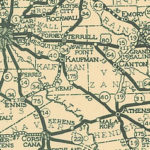HONOLULU — As many as 1,000 people who had registered for the Baptist World Alliance’s Congress this year were unable to attend because they were denied visas by the U.S. government, leaders of the global Baptist organization said July 28.
Security-conscious Americans are increasingly prohibiting entry to foreign nationals attending religious conferences and that is making it difficult for global Baptist meetings to be held in the United States, said the leaders at a press conference at the beginning of the 20th Baptist World Congress.

BWA general secretary Neville Callam (left) and outgoing BWA president David Coffey speak to reporters on the first day of the Baptist World Congress. (Photo by Rand Jenkins)
|
“People want to come to the United States. It’s a wonderful place,” said Neville Callam, general secretary of the Falls Church, Va.-based BWA. “But it’s difficult when general secretaries and presidents [of national Baptist conventions and unions] have saved to come to a conference and they are denied a visa. And there’s nothing anyone can do.
“Of course, states have to protect themselves,” Callam added. “We must take that into account. But it would be very unfortunate if the U.S. had to be eliminated from the list of places to hold meetings.”
Countries in Africa and Asia were the hardest hit by the visa denials, said Emmett Dunn, the BWA’s meetings and conferences director. All 87 delegates from Angola were denied visas, Dunn said, as was 40 percent of Nigeria’s 246-member delegation. Only two of Sierra Leone’s 27 registered delegates were granted visas and only 24 percent of the more than 100 registrants from Bangladesh received permission to enter the U.S. Other hard hit countries were Ghana, Liberia and India.
“We live in post 9-11 world,” said Dunn, acknowledging heightened security concerns.
Registration at this year’s Congress is expected to be about 4,000 – a steep drop from the approximately 10,000 who attended the last Congress five years ago in Birmingham, England. While a fragile economy and Hawaii’s distance from centers of Baptist population both contributed to a smaller attendance, visa denials unquestionably played a role and left many potential travelers frustrated – as many expressed in emails sent to BWA headquarters in Falls Church.
 Sign up for our weekly edition and get all our headlines in your inbox on ThursdaysBWA conference director Emmett Dunn discusses the U.S.\'s denial of visas to about 1,000 conference registrants. (Photo by Rand Jenkins)
|
“We paid our registration fees, we paid also our travel ticket, we have done our reservations … really we lost more money, we’re very sorry,” wrote one of the Angolans whose visa was denied.
“After showing all the required documents … several of us were rejected today for no specific reason,” wrote a delegate from Sierra Leone.
Callam said other global Christian bodies – including the worldwide organizations of Seventh-day Adventists and the Reformed churches – have been impacted by American visa denials, sparking wide-ranging debate about the issue.
In other comments at the press conference, outgoing BWA President David Coffey said his five-year term in office increased his appreciation for Baptists’ diversity and of the challenges to sharing the gospel.
“We don’t need to make the gospel relevant,” said Coffey, a British Baptist pastor and denominational leader. “We do have to demonstrate its relevance. The challenge for us who are international pastors is to demonstrate what is already a relevant gospel to people around the world.”
The BWA also must “demonstrate the ongoing vitality of being Baptist,” which may result in new ways of ministry, said Coffey.
“The next generation may not want to inherit our structures, but they will want to inherit our visions.”
–Robert Dilday is managing editor of Virginia Baptists’ Religious Herald.













We seek to connect God’s story and God’s people around the world. To learn more about God’s story, click here.
Send comments and feedback to Eric Black, our editor. For comments to be published, please specify “letter to the editor.” Maximum length for publication is 300 words.